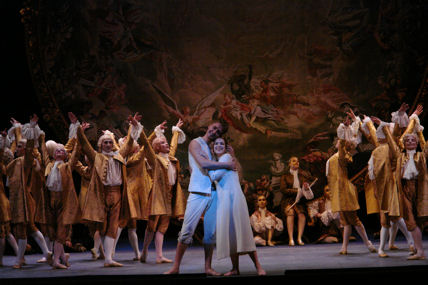Other Links
<Editorial Board
- Editor - Bill Kenny
- London Editor-Melanie Eskenazi
- Founder - Len Mullenger
Google Site Search
SEEN
AND HEARD INTERNATIONAL OPERA REVIEW
Gluck, Orphée et
Eurydice:
(New production) Soloists, chorus. ballet and orchestra of Opéra
Toulon Provence Méditeranée, Giuliano Carella conductor.
Toulon,
France. 12. 9.2007 (MM)
Orpheus is synonymous with opera: the poet sings, making art and
action one, and in the myth he must move hell itself. The bigger
challenge though is to move an audience, and this task is both
easy and hard. Easy if there is the artistic integrity that the
myth itself demands, but hard because both hell and audiences
instantly perceive when art falters. Or falls flat on its face as
did this Orphée et Euridyce at the Toulon Opera.

Announcing a production of an opera with any mention of the Orphic
in the title has come to suggest a flirtation with art itself.
The Harry Kupfer 1991 production of Gluck's Orfeo ed Euridice
(the 1762 Italian version for castrato) at the Komische Oper
Berlin incorporated the orchestra, audience and art itself into
its catharsis while the Trish Brown/Roland Aeschlimann 1998 production
of Monteverdi's Orfeo at Brussel's Monnaie graphically
elaborated and then resolved the puzzles of the Renaissance's
Orpheus myth. The 400th anniversary of the birth of opera was
celebrated at the Getty Center in Los Angeles in 2000 with a
production of Peri's Euridice, one that instilled vibrant
life and high entertainment into this venerable artistic artifact.
Thus there were precedents for excitement about a new
production of Gluck's 1774 version of Orphée et Euridyce
for Paris where Orpheus would be sung by a tenor rather than by a
castrato substitute (a male or female mezzo soprano) or by the
baritone of the 1867 Berlioz edition; not to mention that Toulon
Opera possesses a fine ballet all of which hinting that just
maybe we would have all the forces necessary to realize Gluck's
vision of what Wagner later re-envisioned as
Gesamtkunstwerk.
With the modern orchestral forces of the Toulon Opera there could
be, thankfully, no attempt at a precious Collegium Musicum reading
of the work, thus the tuning tone A was at approximately 448,
considerably higher than the A at 393 in 1774 (giving some real
justification for Berlioz' baritone). That
But if there were any pleasures at all in this evening, they came
from the pit during the third act when Euridice confronted
Orpheus' coldness in a duet that Carella made quiver with the very
Metastasian hyper-emotions Gluck had wished to restrain. Carella
then drove emotional excitement and simple raw speed through
Eurydice's death culminating in Orphée's great lament, delivered
in chokingly exaggerated orchestral phrasing to Orphée's unbridled
despairing lyricism. This was far from the heroic self-awareness
that Gluck and the Enlightenment's Orpheus had worked so hard to
achieve, but worth the price of admission.
The first two acts of Orphée et Eurydice are extended
scenes for chorus and ballet in which Orpheus' predicament
unfolds, each scene centered around an Orpheus monologue and
aria. While the pushed quality and fast vibrato of Russian
tenorino Maxim Mironov worked in Carella's passionate third act,
these fine Rossini attributes were out of place in the stately
pace of these acts; the measured emotions of Chiamo il mio ben
and Che puro cielo simply did not materialize making both
acts a musical and dramatic void.
The brief appearance of the Eurydice was the only excitement
offered. German soprano Henrike Jacob exuding a heated, Carmen
like physical and vocal sexuality that was blatantly foreign to
the intelligence of the Orpheus' tragedy.
The two pantomimes of the second act, the furies barring Orpheus'
entry into hell and the blessed souls of the Elysian Fields,
unfolded in what seemed to be some sort of anti-choreography, the
first pantomime clumsily mimicking grotesque motions and the
second a moving circle miming some sort of dead harmony : so much
for Gluck's intention of integrating the complex ballets of the
intermèdes of French tragedie lyrique into the action
of the opera. All the more confusing because there was a
choreographer credit in the program.
Jack-of-all-theater-trades Numa Sadoul, born in Brazzaville though
one assumes naturalized to France, staged the opera, taking the
chorus that Gluck had so carefully integrated into the opera out
of the action, dressing the choristers in costumer Luc Londiveau's
idea as to what would pass for eighteenth century finery and
seating them in the first two levels of the boxes overhanging the
orchestra pit. With Amore - French soprano Joanna Malewski and
her two mute accomplices in eighteenth century dress as well -
director Sadoul apparently intended to frame the action within
some sort of historical context though no perspective made itself
discernable. The result was to distance the
audience from any
confrontation with the complexities of the Orpheus tragedy.
But, voilà, the ballet! Finalment! With
everything finished except for the last chorus celebrating the
inevitable happy ending, sixteen golden eighteenth century
courtiers invaded the stage, and we saw that they were not the
clumsy furies and the bored souls of Act II, but eight real
ballerinas and eight real ballerinos who carried out a complex
choreography in classic ballet movements for perhaps thirty
minutes. They danced to the music that Gluck was obliged to
provide for an extended ballet segment at the 1774 production, a
ballet that had absolutely nothing to do with his opera and
occurred only after the unities of his tragedy were complete.
In Toulon however, Gluck's final celebratory chorus was a stinger to
this ballet, director Numa Sadoul somehow managing to outmaneuver
Gluck once again. France would be far wiser to invest in
augmenting its arsenal of nuclear weaponry rather than adding yet
more mediocre (or worse) productions to its opera repertory.
Michael Milenski
Picture © Opéra
Toulon Provence Méditeranée
